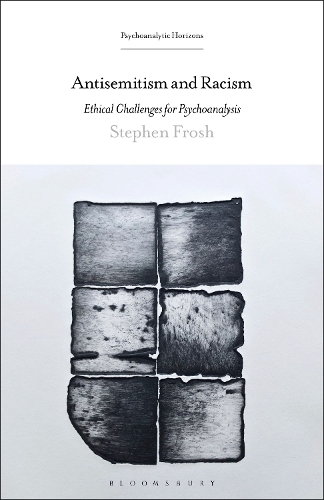
Antisemitism and Racism: Ethical Challenges for Psychoanalysis
(Hardback)
Available Formats
Publishing Details
Antisemitism and Racism: Ethical Challenges for Psychoanalysis
By (Author) Stephen Frosh
Series edited by Professor Esther Rashkin
Series edited by Professor Mari Ruti
Series edited by Professor Peter L. Rudnytsky
Bloomsbury Publishing USA
Bloomsbury Publishing USA
5th October 2023
United States
Classifications
Tertiary Education
Non Fiction
Literary theory
Racism and racial discrimination / Anti-racism
305.8924
Physical Properties
Hardback
208
Width 140mm, Height 216mm
Description
Psychoanalysis has not had a comfortable history in relation to "race" and racism, despite its origins in the Jewish lives of Freud and its other first-generation progenitors and the insistent pressure of antisemitism upon it. Indeed, the failure to fully address racism is a running sore in the psychoanalytic movement. This has begun to be remedied in recent years, but it is still the case that psychoanalysis struggles to incorporate antiracist perspectives and that this might be a reason why it has engaged relatively poorly with Black communities. Psychoanalysis may have been a "Jewish science" in a positive sense, but it has not fully leveraged this to become a truly antiracist one. In Antisemitism and Racism, Stephen Frosh, a leading figure in psychoanalytic studies, provides a psychoanalytically-informed examination of the relations between antisemitism and antiblack racism. Frosh's starting point is a claim that the Jewish origins and implications of psychoanalysis fuel its capacity to interrogate racism of all kinds. Indeed, the shared experience of exposure to different kinds of racism raises prospects for renewed alliances between Jewish and Black communities. Antisemitism and Racism ends with a chapter that asks psychoanalysis itself to respond to some of the challenges emerging from the Black Lives Matter and decolonial movements. At a time when division and prejudice are on the rise to an alarming degree, it is imperative that we examine, understand, and discuss the psychological roots of racism.
Reviews
Committed to a thoroughly relational understanding of subjectivity and group life, an ethical relationality respectful of both the singular and the universal, Frosh puts into revealing and complex conversation racism, antisemitism and, as grounding for understanding and combatting both of these 'isms,' an emancipatory psychoanalysis. Frosh argues that Judaism and emancipatory psychoanalysis share an ethical project that crucially important in times like ours resists all fundamentalisms. Introducing the reader to numerous philosophers, analysts, and political theorists, Frosh makes a compelling case for a 'solidarity of the oppressed.' * Lynne Layton, author of Toward a Social Psychoanalysis: Culture, Character and Normative Unconscious Processes *
Racism thrives on division. This bold new book challenges a division, invoked from time to time, between anti-black racism and antisemitism, in which Jewishness is firmly yoked to whiteness. Working from an ethical base rooted in his Jewish identity, which has psychoanalytic resonances, Stephen Frosh interrogates this assumption and builds a compelling case that the experience of antisemitism provides a basis for solidarity with those othered by anti-black racism. Froshs scholarship is erudite and deep, his writing elegant and accessible, his scope broad and inclusive and his discourse nuanced and complex, creating a work with wide relevance that is a must read for all aspiring to advance the cause of anti-racism today. * M. Fakhry Davids, Supervising and Training Analyst, British Psychoanalytical Society, and author of Internal Racism: A PsychoanalytIc Approach to Race and Difference *
In this lucid and timely book, Stephen Frosh pursues an ethic of antiracist solidarity for psychoanalysis. Interrogating the conflation of Jewishness and whiteness, he locates a fundamental concern for otherness as well as a sensitivity to racialized suffering within the Jewish heritage of sychoanalysis. Frosh deftly examines the vexed issues at the crossroads of his three concerns (racism, antisemitism, psychoanalysis), providing a valuable, insightful resource for psychoanalysis as it seeks to overcome its past exclusions and meet the challenges of contemporary antiblack racism. * Celia Brickman, Chicago Center for Psychoanalysis and Psychoanalytic Psychotherapy, and author of Race in Psychoanalysis: Aboriginal Populations in the Mind *
Author Bio
Stephen Frosh is Professor in the Department of Psychosocial Studies at Birkbeck, University of London, and author of numerous books on psychoanalysis and psychosocial studies, including A Brief Introduction to Psychoanalytic Theory (2012) and Psychoanalysis Outside the Clinic (2010).
